Leadership and Operations Management Report: Unilever PLC Analysis
VerifiedAdded on 2022/12/29
|15
|4766
|93
Report
AI Summary
This report provides a comprehensive analysis of leadership, management, and operations, with a specific focus on the multinational consumer goods company, Unilever PLC. The report begins by defining and comparing the roles and characteristics of leaders and managers, highlighting their differences and interdependencies within an organizational context. It then examines how these roles apply in different situational contexts, providing practical examples of change management and team management within Unilever. The report further delves into various leadership theories and models, including situational leadership, systems leadership, and contingency leadership, evaluating their strengths and weaknesses. The core of the report explores key approaches to operations management, emphasizing the crucial roles of leaders and managers in achieving business objectives. It also assesses the factors within the business environment that impact operational management and decision-making. The report concludes with a summary of the key findings and insights regarding the effective integration of leadership and operational strategies for organizational success.
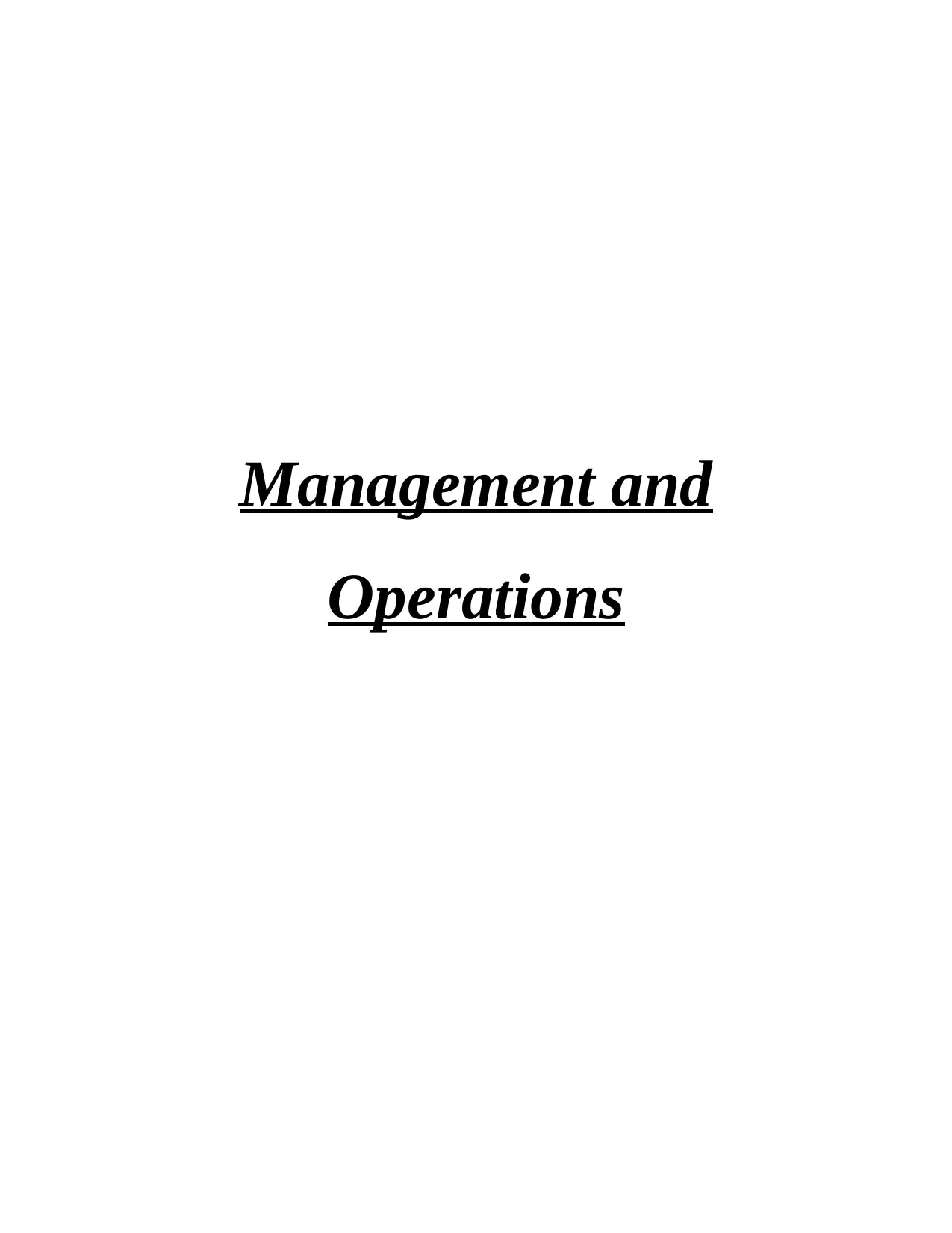
Management and
Operations
Operations
Paraphrase This Document
Need a fresh take? Get an instant paraphrase of this document with our AI Paraphraser
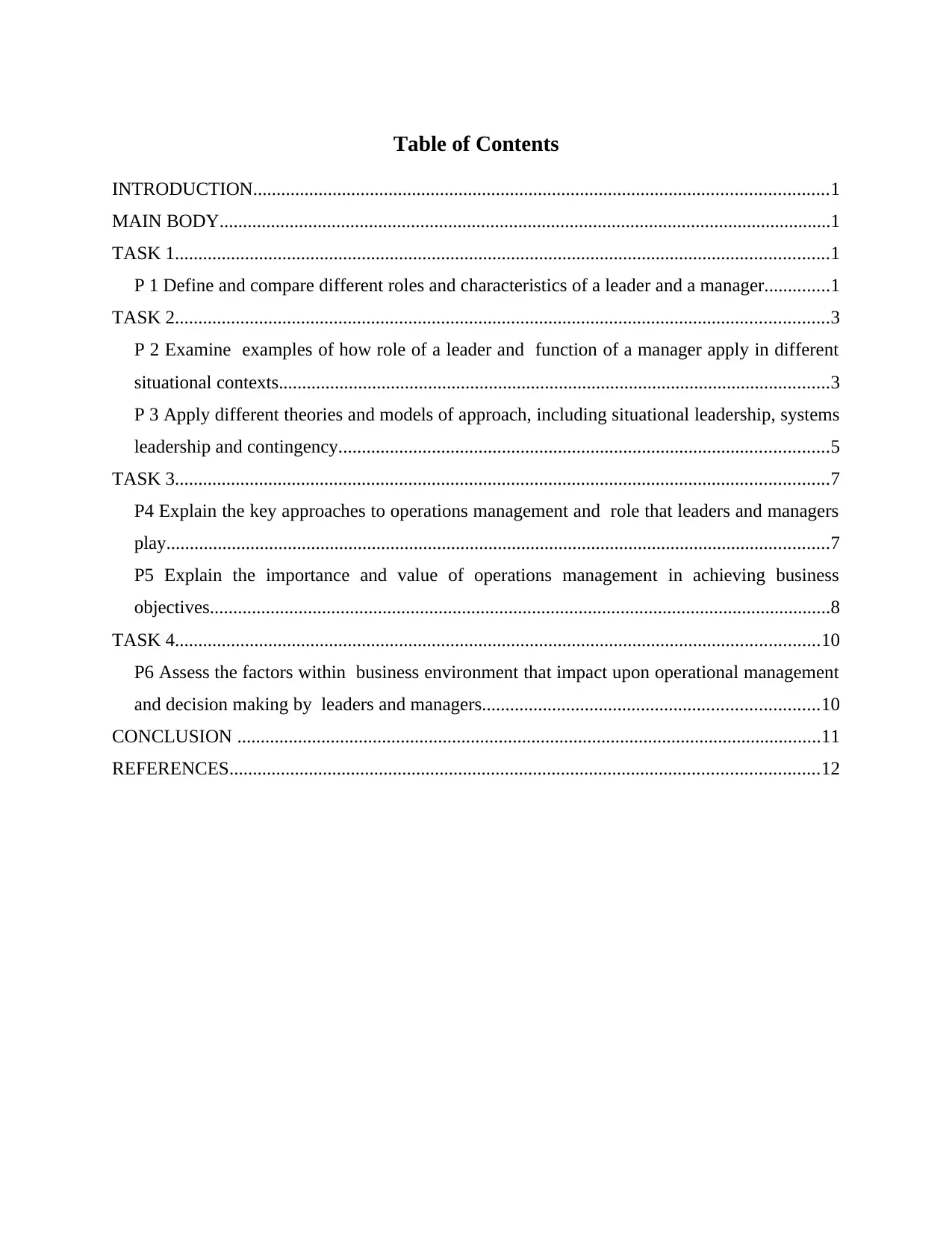
Table of Contents
INTRODUCTION...........................................................................................................................1
MAIN BODY...................................................................................................................................1
TASK 1............................................................................................................................................1
P 1 Define and compare different roles and characteristics of a leader and a manager..............1
TASK 2............................................................................................................................................3
P 2 Examine examples of how role of a leader and function of a manager apply in different
situational contexts......................................................................................................................3
P 3 Apply different theories and models of approach, including situational leadership, systems
leadership and contingency.........................................................................................................5
TASK 3............................................................................................................................................7
P4 Explain the key approaches to operations management and role that leaders and managers
play..............................................................................................................................................7
P5 Explain the importance and value of operations management in achieving business
objectives.....................................................................................................................................8
TASK 4..........................................................................................................................................10
P6 Assess the factors within business environment that impact upon operational management
and decision making by leaders and managers........................................................................10
CONCLUSION .............................................................................................................................11
REFERENCES..............................................................................................................................12
INTRODUCTION...........................................................................................................................1
MAIN BODY...................................................................................................................................1
TASK 1............................................................................................................................................1
P 1 Define and compare different roles and characteristics of a leader and a manager..............1
TASK 2............................................................................................................................................3
P 2 Examine examples of how role of a leader and function of a manager apply in different
situational contexts......................................................................................................................3
P 3 Apply different theories and models of approach, including situational leadership, systems
leadership and contingency.........................................................................................................5
TASK 3............................................................................................................................................7
P4 Explain the key approaches to operations management and role that leaders and managers
play..............................................................................................................................................7
P5 Explain the importance and value of operations management in achieving business
objectives.....................................................................................................................................8
TASK 4..........................................................................................................................................10
P6 Assess the factors within business environment that impact upon operational management
and decision making by leaders and managers........................................................................10
CONCLUSION .............................................................................................................................11
REFERENCES..............................................................................................................................12
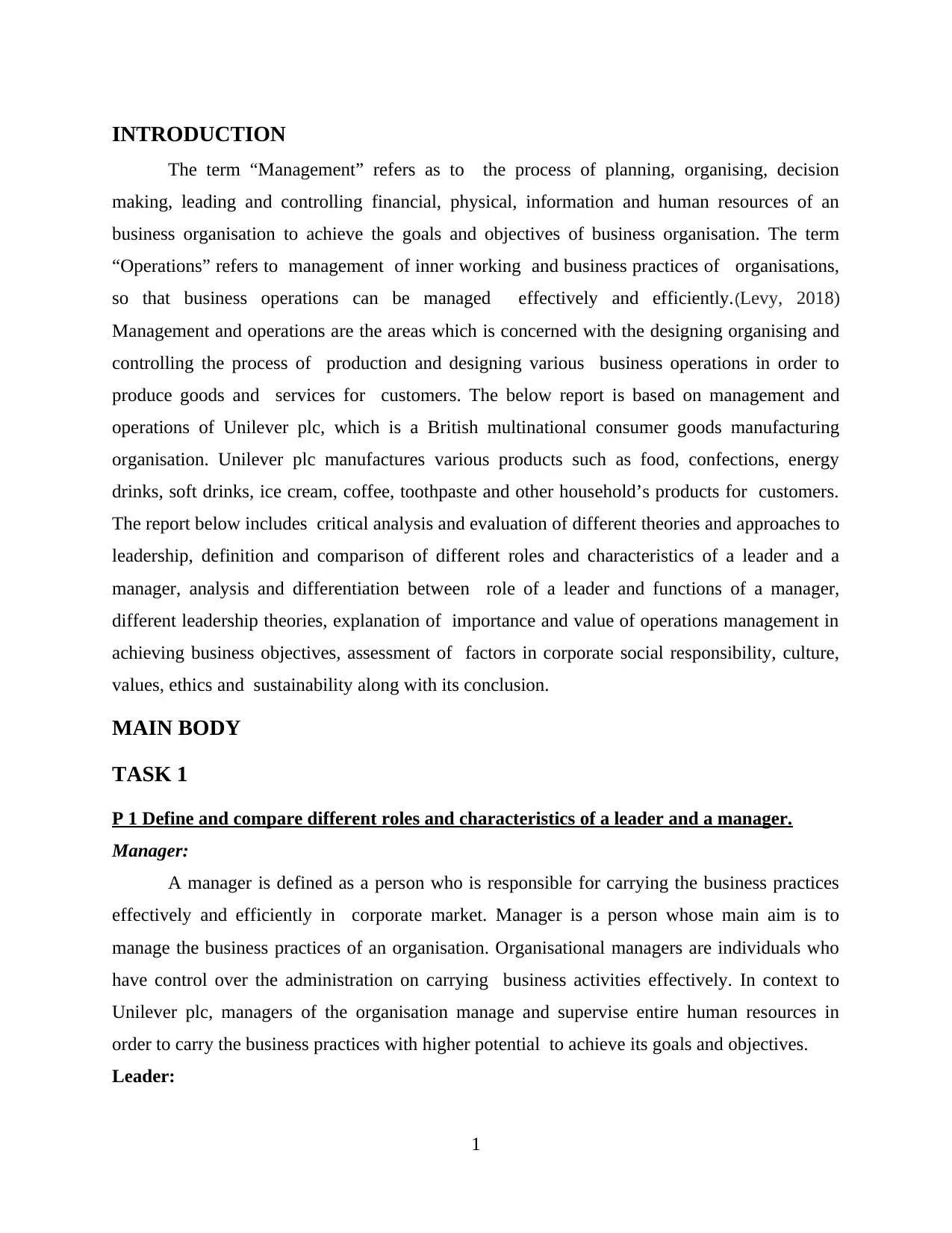
INTRODUCTION
The term “Management” refers as to the process of planning, organising, decision
making, leading and controlling financial, physical, information and human resources of an
business organisation to achieve the goals and objectives of business organisation. The term
“Operations” refers to management of inner working and business practices of organisations,
so that business operations can be managed effectively and efficiently.(Levy, 2018)
Management and operations are the areas which is concerned with the designing organising and
controlling the process of production and designing various business operations in order to
produce goods and services for customers. The below report is based on management and
operations of Unilever plc, which is a British multinational consumer goods manufacturing
organisation. Unilever plc manufactures various products such as food, confections, energy
drinks, soft drinks, ice cream, coffee, toothpaste and other household’s products for customers.
The report below includes critical analysis and evaluation of different theories and approaches to
leadership, definition and comparison of different roles and characteristics of a leader and a
manager, analysis and differentiation between role of a leader and functions of a manager,
different leadership theories, explanation of importance and value of operations management in
achieving business objectives, assessment of factors in corporate social responsibility, culture,
values, ethics and sustainability along with its conclusion.
MAIN BODY
TASK 1
P 1 Define and compare different roles and characteristics of a leader and a manager.
Manager:
A manager is defined as a person who is responsible for carrying the business practices
effectively and efficiently in corporate market. Manager is a person whose main aim is to
manage the business practices of an organisation. Organisational managers are individuals who
have control over the administration on carrying business activities effectively. In context to
Unilever plc, managers of the organisation manage and supervise entire human resources in
order to carry the business practices with higher potential to achieve its goals and objectives.
Leader:
1
The term “Management” refers as to the process of planning, organising, decision
making, leading and controlling financial, physical, information and human resources of an
business organisation to achieve the goals and objectives of business organisation. The term
“Operations” refers to management of inner working and business practices of organisations,
so that business operations can be managed effectively and efficiently.(Levy, 2018)
Management and operations are the areas which is concerned with the designing organising and
controlling the process of production and designing various business operations in order to
produce goods and services for customers. The below report is based on management and
operations of Unilever plc, which is a British multinational consumer goods manufacturing
organisation. Unilever plc manufactures various products such as food, confections, energy
drinks, soft drinks, ice cream, coffee, toothpaste and other household’s products for customers.
The report below includes critical analysis and evaluation of different theories and approaches to
leadership, definition and comparison of different roles and characteristics of a leader and a
manager, analysis and differentiation between role of a leader and functions of a manager,
different leadership theories, explanation of importance and value of operations management in
achieving business objectives, assessment of factors in corporate social responsibility, culture,
values, ethics and sustainability along with its conclusion.
MAIN BODY
TASK 1
P 1 Define and compare different roles and characteristics of a leader and a manager.
Manager:
A manager is defined as a person who is responsible for carrying the business practices
effectively and efficiently in corporate market. Manager is a person whose main aim is to
manage the business practices of an organisation. Organisational managers are individuals who
have control over the administration on carrying business activities effectively. In context to
Unilever plc, managers of the organisation manage and supervise entire human resources in
order to carry the business practices with higher potential to achieve its goals and objectives.
Leader:
1
⊘ This is a preview!⊘
Do you want full access?
Subscribe today to unlock all pages.

Trusted by 1+ million students worldwide
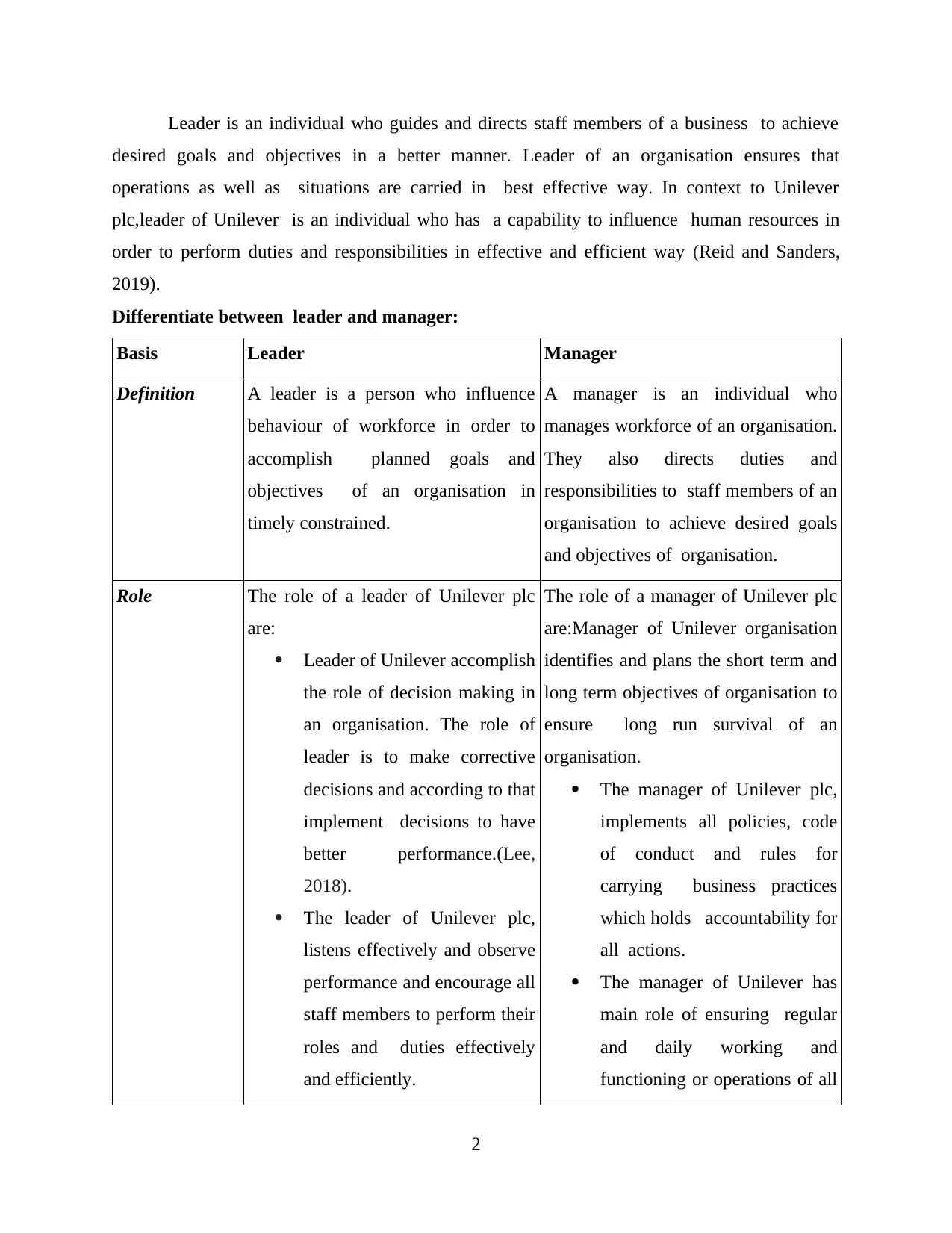
Leader is an individual who guides and directs staff members of a business to achieve
desired goals and objectives in a better manner. Leader of an organisation ensures that
operations as well as situations are carried in best effective way. In context to Unilever
plc,leader of Unilever is an individual who has a capability to influence human resources in
order to perform duties and responsibilities in effective and efficient way (Reid and Sanders,
2019).
Differentiate between leader and manager:
Basis Leader Manager
Definition A leader is a person who influence
behaviour of workforce in order to
accomplish planned goals and
objectives of an organisation in
timely constrained.
A manager is an individual who
manages workforce of an organisation.
They also directs duties and
responsibilities to staff members of an
organisation to achieve desired goals
and objectives of organisation.
Role The role of a leader of Unilever plc
are:
Leader of Unilever accomplish
the role of decision making in
an organisation. The role of
leader is to make corrective
decisions and according to that
implement decisions to have
better performance.(Lee,
2018).
The leader of Unilever plc,
listens effectively and observe
performance and encourage all
staff members to perform their
roles and duties effectively
and efficiently.
The role of a manager of Unilever plc
are:Manager of Unilever organisation
identifies and plans the short term and
long term objectives of organisation to
ensure long run survival of an
organisation.
The manager of Unilever plc,
implements all policies, code
of conduct and rules for
carrying business practices
which holds accountability for
all actions.
The manager of Unilever has
main role of ensuring regular
and daily working and
functioning or operations of all
2
desired goals and objectives in a better manner. Leader of an organisation ensures that
operations as well as situations are carried in best effective way. In context to Unilever
plc,leader of Unilever is an individual who has a capability to influence human resources in
order to perform duties and responsibilities in effective and efficient way (Reid and Sanders,
2019).
Differentiate between leader and manager:
Basis Leader Manager
Definition A leader is a person who influence
behaviour of workforce in order to
accomplish planned goals and
objectives of an organisation in
timely constrained.
A manager is an individual who
manages workforce of an organisation.
They also directs duties and
responsibilities to staff members of an
organisation to achieve desired goals
and objectives of organisation.
Role The role of a leader of Unilever plc
are:
Leader of Unilever accomplish
the role of decision making in
an organisation. The role of
leader is to make corrective
decisions and according to that
implement decisions to have
better performance.(Lee,
2018).
The leader of Unilever plc,
listens effectively and observe
performance and encourage all
staff members to perform their
roles and duties effectively
and efficiently.
The role of a manager of Unilever plc
are:Manager of Unilever organisation
identifies and plans the short term and
long term objectives of organisation to
ensure long run survival of an
organisation.
The manager of Unilever plc,
implements all policies, code
of conduct and rules for
carrying business practices
which holds accountability for
all actions.
The manager of Unilever has
main role of ensuring regular
and daily working and
functioning or operations of all
2
Paraphrase This Document
Need a fresh take? Get an instant paraphrase of this document with our AI Paraphraser
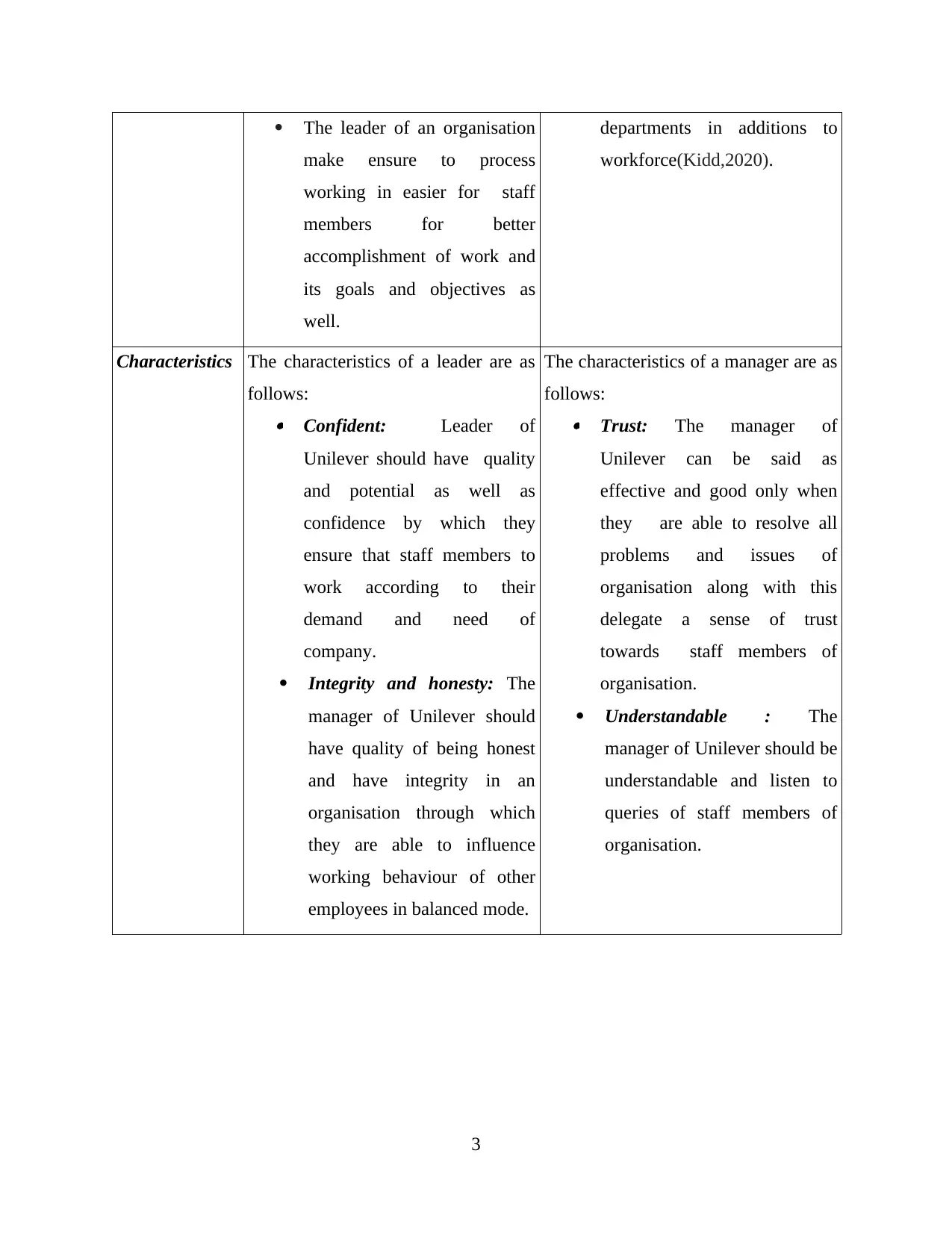
The leader of an organisation
make ensure to process
working in easier for staff
members for better
accomplishment of work and
its goals and objectives as
well.
departments in additions to
workforce(Kidd,2020).
Characteristics The characteristics of a leader are as
follows:
Confident: Leader of
Unilever should have quality
and potential as well as
confidence by which they
ensure that staff members to
work according to their
demand and need of
company.
Integrity and honesty: The
manager of Unilever should
have quality of being honest
and have integrity in an
organisation through which
they are able to influence
working behaviour of other
employees in balanced mode.
The characteristics of a manager are as
follows:
Trust: The manager of
Unilever can be said as
effective and good only when
they are able to resolve all
problems and issues of
organisation along with this
delegate a sense of trust
towards staff members of
organisation.
Understandable : The
manager of Unilever should be
understandable and listen to
queries of staff members of
organisation.
3
make ensure to process
working in easier for staff
members for better
accomplishment of work and
its goals and objectives as
well.
departments in additions to
workforce(Kidd,2020).
Characteristics The characteristics of a leader are as
follows:
Confident: Leader of
Unilever should have quality
and potential as well as
confidence by which they
ensure that staff members to
work according to their
demand and need of
company.
Integrity and honesty: The
manager of Unilever should
have quality of being honest
and have integrity in an
organisation through which
they are able to influence
working behaviour of other
employees in balanced mode.
The characteristics of a manager are as
follows:
Trust: The manager of
Unilever can be said as
effective and good only when
they are able to resolve all
problems and issues of
organisation along with this
delegate a sense of trust
towards staff members of
organisation.
Understandable : The
manager of Unilever should be
understandable and listen to
queries of staff members of
organisation.
3
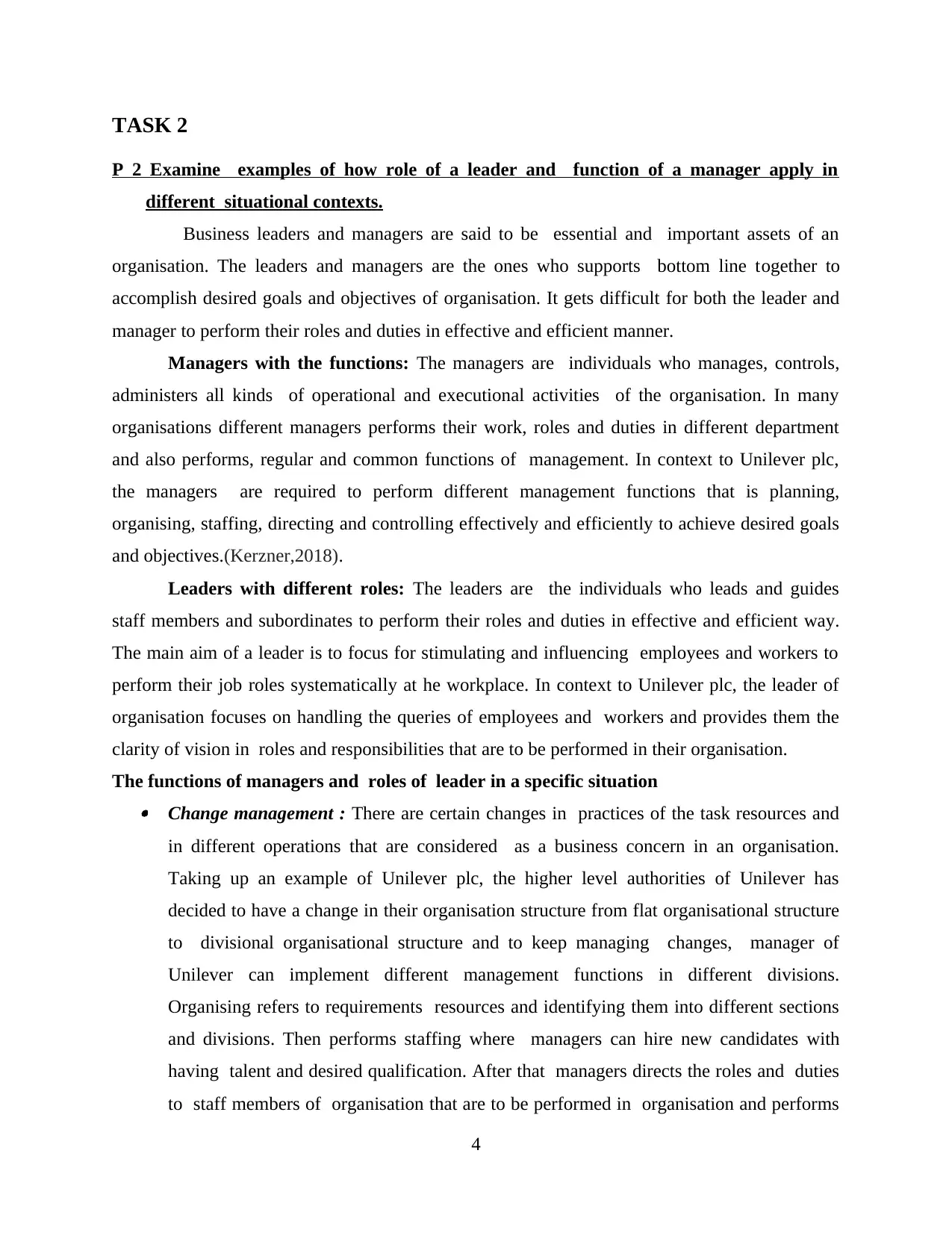
TASK 2
P 2 Examine examples of how role of a leader and function of a manager apply in
different situational contexts.
Business leaders and managers are said to be essential and important assets of an
organisation. The leaders and managers are the ones who supports bottom line together to
accomplish desired goals and objectives of organisation. It gets difficult for both the leader and
manager to perform their roles and duties in effective and efficient manner.
Managers with the functions: The managers are individuals who manages, controls,
administers all kinds of operational and executional activities of the organisation. In many
organisations different managers performs their work, roles and duties in different department
and also performs, regular and common functions of management. In context to Unilever plc,
the managers are required to perform different management functions that is planning,
organising, staffing, directing and controlling effectively and efficiently to achieve desired goals
and objectives.(Kerzner,2018).
Leaders with different roles: The leaders are the individuals who leads and guides
staff members and subordinates to perform their roles and duties in effective and efficient way.
The main aim of a leader is to focus for stimulating and influencing employees and workers to
perform their job roles systematically at he workplace. In context to Unilever plc, the leader of
organisation focuses on handling the queries of employees and workers and provides them the
clarity of vision in roles and responsibilities that are to be performed in their organisation.
The functions of managers and roles of leader in a specific situation Change management : There are certain changes in practices of the task resources and
in different operations that are considered as a business concern in an organisation.
Taking up an example of Unilever plc, the higher level authorities of Unilever has
decided to have a change in their organisation structure from flat organisational structure
to divisional organisational structure and to keep managing changes, manager of
Unilever can implement different management functions in different divisions.
Organising refers to requirements resources and identifying them into different sections
and divisions. Then performs staffing where managers can hire new candidates with
having talent and desired qualification. After that managers directs the roles and duties
to staff members of organisation that are to be performed in organisation and performs
4
P 2 Examine examples of how role of a leader and function of a manager apply in
different situational contexts.
Business leaders and managers are said to be essential and important assets of an
organisation. The leaders and managers are the ones who supports bottom line together to
accomplish desired goals and objectives of organisation. It gets difficult for both the leader and
manager to perform their roles and duties in effective and efficient manner.
Managers with the functions: The managers are individuals who manages, controls,
administers all kinds of operational and executional activities of the organisation. In many
organisations different managers performs their work, roles and duties in different department
and also performs, regular and common functions of management. In context to Unilever plc,
the managers are required to perform different management functions that is planning,
organising, staffing, directing and controlling effectively and efficiently to achieve desired goals
and objectives.(Kerzner,2018).
Leaders with different roles: The leaders are the individuals who leads and guides
staff members and subordinates to perform their roles and duties in effective and efficient way.
The main aim of a leader is to focus for stimulating and influencing employees and workers to
perform their job roles systematically at he workplace. In context to Unilever plc, the leader of
organisation focuses on handling the queries of employees and workers and provides them the
clarity of vision in roles and responsibilities that are to be performed in their organisation.
The functions of managers and roles of leader in a specific situation Change management : There are certain changes in practices of the task resources and
in different operations that are considered as a business concern in an organisation.
Taking up an example of Unilever plc, the higher level authorities of Unilever has
decided to have a change in their organisation structure from flat organisational structure
to divisional organisational structure and to keep managing changes, manager of
Unilever can implement different management functions in different divisions.
Organising refers to requirements resources and identifying them into different sections
and divisions. Then performs staffing where managers can hire new candidates with
having talent and desired qualification. After that managers directs the roles and duties
to staff members of organisation that are to be performed in organisation and performs
4
⊘ This is a preview!⊘
Do you want full access?
Subscribe today to unlock all pages.

Trusted by 1+ million students worldwide
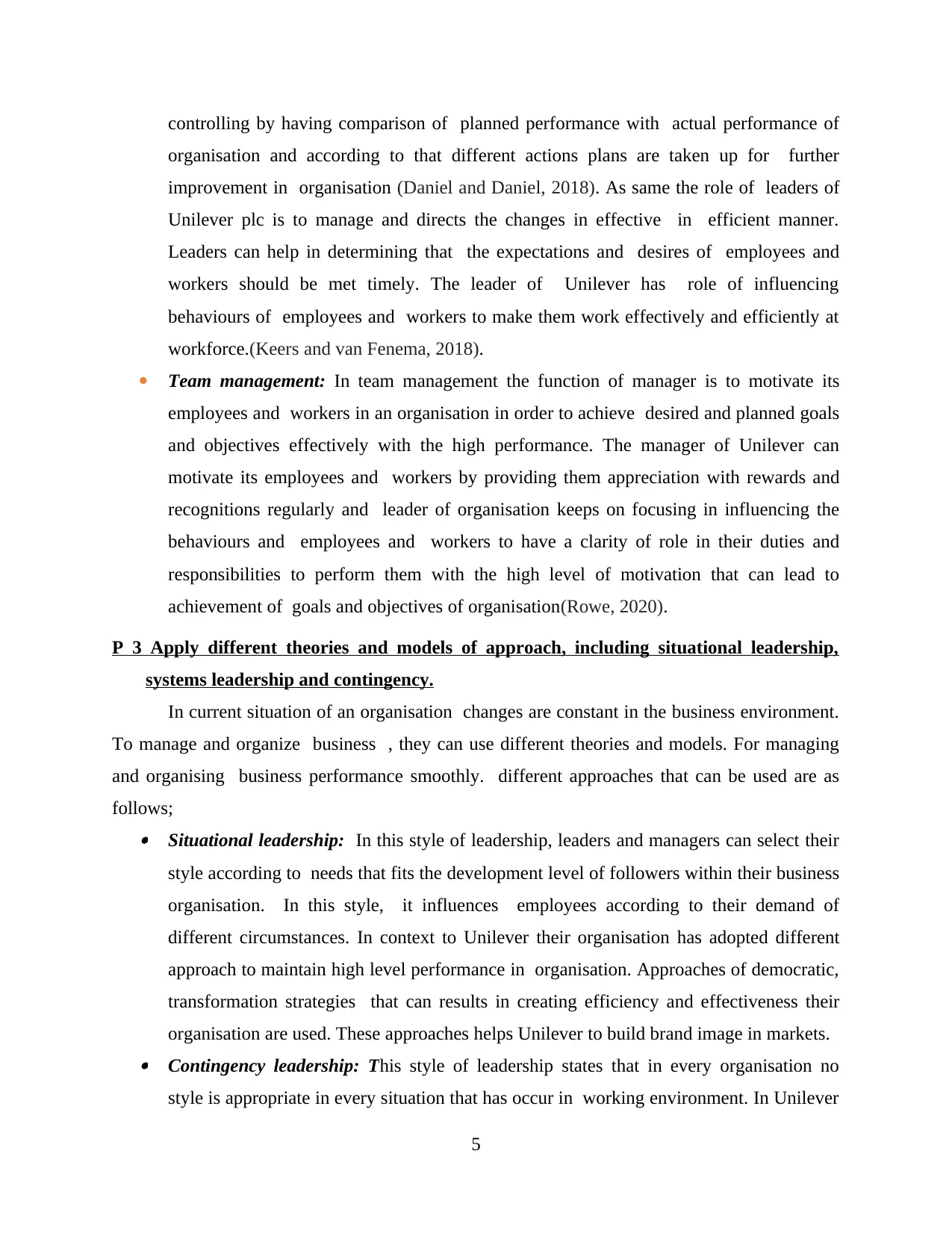
controlling by having comparison of planned performance with actual performance of
organisation and according to that different actions plans are taken up for further
improvement in organisation (Daniel and Daniel, 2018). As same the role of leaders of
Unilever plc is to manage and directs the changes in effective in efficient manner.
Leaders can help in determining that the expectations and desires of employees and
workers should be met timely. The leader of Unilever has role of influencing
behaviours of employees and workers to make them work effectively and efficiently at
workforce.(Keers and van Fenema, 2018).
Team management: In team management the function of manager is to motivate its
employees and workers in an organisation in order to achieve desired and planned goals
and objectives effectively with the high performance. The manager of Unilever can
motivate its employees and workers by providing them appreciation with rewards and
recognitions regularly and leader of organisation keeps on focusing in influencing the
behaviours and employees and workers to have a clarity of role in their duties and
responsibilities to perform them with the high level of motivation that can lead to
achievement of goals and objectives of organisation(Rowe, 2020).
P 3 Apply different theories and models of approach, including situational leadership,
systems leadership and contingency.
In current situation of an organisation changes are constant in the business environment.
To manage and organize business , they can use different theories and models. For managing
and organising business performance smoothly. different approaches that can be used are as
follows; Situational leadership: In this style of leadership, leaders and managers can select their
style according to needs that fits the development level of followers within their business
organisation. In this style, it influences employees according to their demand of
different circumstances. In context to Unilever their organisation has adopted different
approach to maintain high level performance in organisation. Approaches of democratic,
transformation strategies that can results in creating efficiency and effectiveness their
organisation are used. These approaches helps Unilever to build brand image in markets. Contingency leadership: This style of leadership states that in every organisation no
style is appropriate in every situation that has occur in working environment. In Unilever
5
organisation and according to that different actions plans are taken up for further
improvement in organisation (Daniel and Daniel, 2018). As same the role of leaders of
Unilever plc is to manage and directs the changes in effective in efficient manner.
Leaders can help in determining that the expectations and desires of employees and
workers should be met timely. The leader of Unilever has role of influencing
behaviours of employees and workers to make them work effectively and efficiently at
workforce.(Keers and van Fenema, 2018).
Team management: In team management the function of manager is to motivate its
employees and workers in an organisation in order to achieve desired and planned goals
and objectives effectively with the high performance. The manager of Unilever can
motivate its employees and workers by providing them appreciation with rewards and
recognitions regularly and leader of organisation keeps on focusing in influencing the
behaviours and employees and workers to have a clarity of role in their duties and
responsibilities to perform them with the high level of motivation that can lead to
achievement of goals and objectives of organisation(Rowe, 2020).
P 3 Apply different theories and models of approach, including situational leadership,
systems leadership and contingency.
In current situation of an organisation changes are constant in the business environment.
To manage and organize business , they can use different theories and models. For managing
and organising business performance smoothly. different approaches that can be used are as
follows; Situational leadership: In this style of leadership, leaders and managers can select their
style according to needs that fits the development level of followers within their business
organisation. In this style, it influences employees according to their demand of
different circumstances. In context to Unilever their organisation has adopted different
approach to maintain high level performance in organisation. Approaches of democratic,
transformation strategies that can results in creating efficiency and effectiveness their
organisation are used. These approaches helps Unilever to build brand image in markets. Contingency leadership: This style of leadership states that in every organisation no
style is appropriate in every situation that has occur in working environment. In Unilever
5
Paraphrase This Document
Need a fresh take? Get an instant paraphrase of this document with our AI Paraphraser
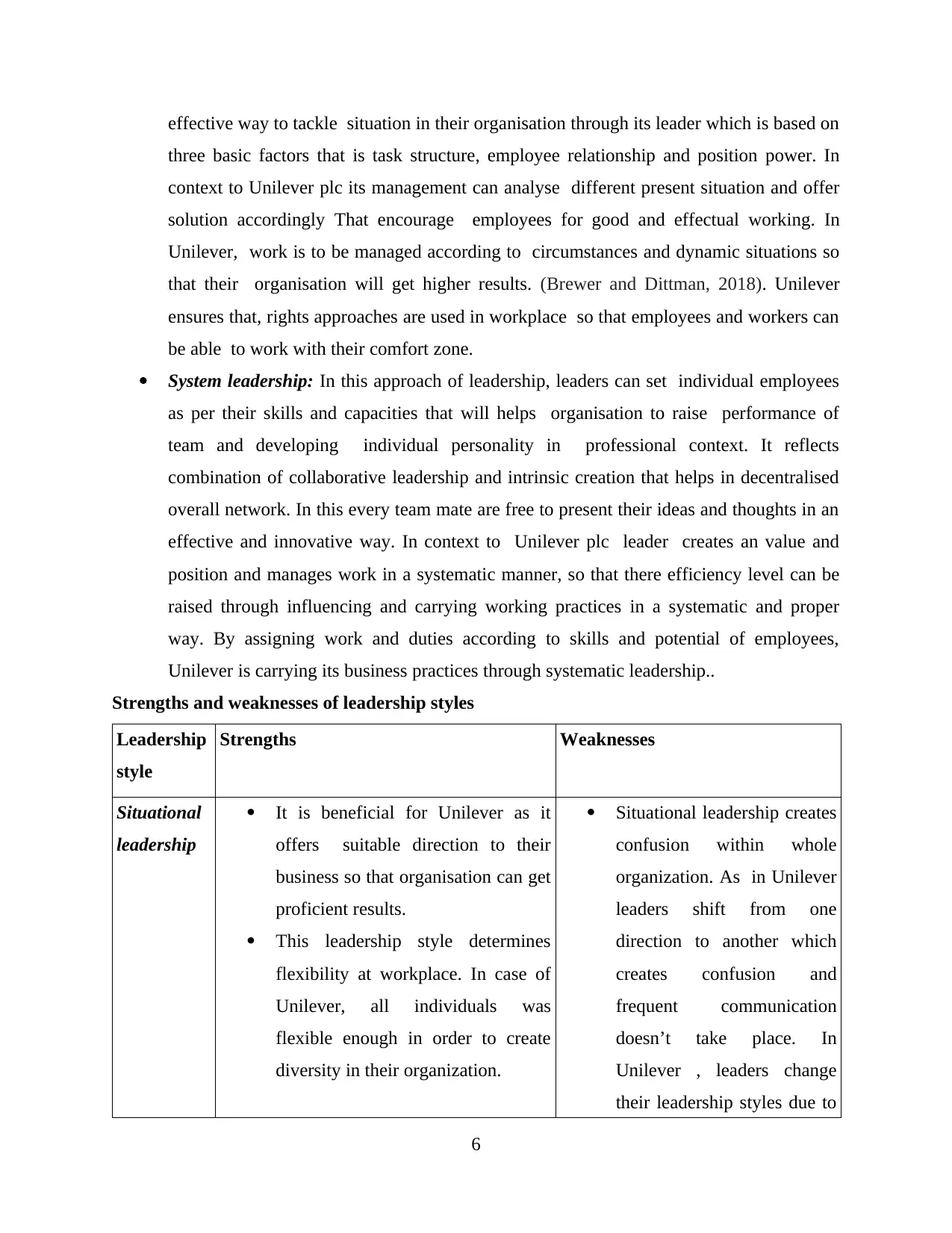
effective way to tackle situation in their organisation through its leader which is based on
three basic factors that is task structure, employee relationship and position power. In
context to Unilever plc its management can analyse different present situation and offer
solution accordingly That encourage employees for good and effectual working. In
Unilever, work is to be managed according to circumstances and dynamic situations so
that their organisation will get higher results. (Brewer and Dittman, 2018). Unilever
ensures that, rights approaches are used in workplace so that employees and workers can
be able to work with their comfort zone.
System leadership: In this approach of leadership, leaders can set individual employees
as per their skills and capacities that will helps organisation to raise performance of
team and developing individual personality in professional context. It reflects
combination of collaborative leadership and intrinsic creation that helps in decentralised
overall network. In this every team mate are free to present their ideas and thoughts in an
effective and innovative way. In context to Unilever plc leader creates an value and
position and manages work in a systematic manner, so that there efficiency level can be
raised through influencing and carrying working practices in a systematic and proper
way. By assigning work and duties according to skills and potential of employees,
Unilever is carrying its business practices through systematic leadership..
Strengths and weaknesses of leadership styles
Leadership
style
Strengths Weaknesses
Situational
leadership
It is beneficial for Unilever as it
offers suitable direction to their
business so that organisation can get
proficient results.
This leadership style determines
flexibility at workplace. In case of
Unilever, all individuals was
flexible enough in order to create
diversity in their organization.
Situational leadership creates
confusion within whole
organization. As in Unilever
leaders shift from one
direction to another which
creates confusion and
frequent communication
doesn’t take place. In
Unilever , leaders change
their leadership styles due to
6
three basic factors that is task structure, employee relationship and position power. In
context to Unilever plc its management can analyse different present situation and offer
solution accordingly That encourage employees for good and effectual working. In
Unilever, work is to be managed according to circumstances and dynamic situations so
that their organisation will get higher results. (Brewer and Dittman, 2018). Unilever
ensures that, rights approaches are used in workplace so that employees and workers can
be able to work with their comfort zone.
System leadership: In this approach of leadership, leaders can set individual employees
as per their skills and capacities that will helps organisation to raise performance of
team and developing individual personality in professional context. It reflects
combination of collaborative leadership and intrinsic creation that helps in decentralised
overall network. In this every team mate are free to present their ideas and thoughts in an
effective and innovative way. In context to Unilever plc leader creates an value and
position and manages work in a systematic manner, so that there efficiency level can be
raised through influencing and carrying working practices in a systematic and proper
way. By assigning work and duties according to skills and potential of employees,
Unilever is carrying its business practices through systematic leadership..
Strengths and weaknesses of leadership styles
Leadership
style
Strengths Weaknesses
Situational
leadership
It is beneficial for Unilever as it
offers suitable direction to their
business so that organisation can get
proficient results.
This leadership style determines
flexibility at workplace. In case of
Unilever, all individuals was
flexible enough in order to create
diversity in their organization.
Situational leadership creates
confusion within whole
organization. As in Unilever
leaders shift from one
direction to another which
creates confusion and
frequent communication
doesn’t take place. In
Unilever , leaders change
their leadership styles due to
6
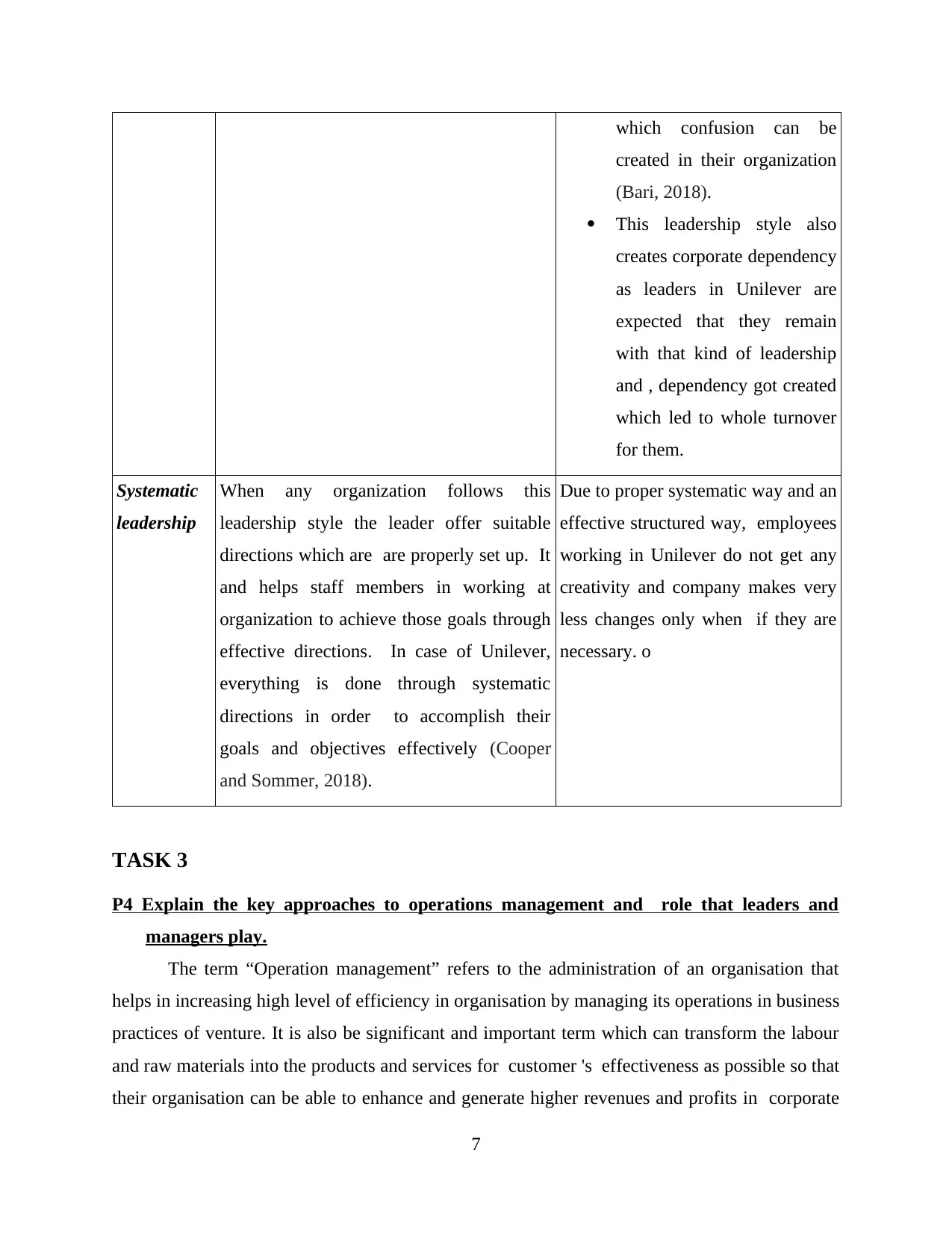
which confusion can be
created in their organization
(Bari, 2018).
This leadership style also
creates corporate dependency
as leaders in Unilever are
expected that they remain
with that kind of leadership
and , dependency got created
which led to whole turnover
for them.
Systematic
leadership
When any organization follows this
leadership style the leader offer suitable
directions which are are properly set up. It
and helps staff members in working at
organization to achieve those goals through
effective directions. In case of Unilever,
everything is done through systematic
directions in order to accomplish their
goals and objectives effectively (Cooper
and Sommer, 2018).
Due to proper systematic way and an
effective structured way, employees
working in Unilever do not get any
creativity and company makes very
less changes only when if they are
necessary. o
TASK 3
P4 Explain the key approaches to operations management and role that leaders and
managers play.
The term “Operation management” refers to the administration of an organisation that
helps in increasing high level of efficiency in organisation by managing its operations in business
practices of venture. It is also be significant and important term which can transform the labour
and raw materials into the products and services for customer 's effectiveness as possible so that
their organisation can be able to enhance and generate higher revenues and profits in corporate
7
created in their organization
(Bari, 2018).
This leadership style also
creates corporate dependency
as leaders in Unilever are
expected that they remain
with that kind of leadership
and , dependency got created
which led to whole turnover
for them.
Systematic
leadership
When any organization follows this
leadership style the leader offer suitable
directions which are are properly set up. It
and helps staff members in working at
organization to achieve those goals through
effective directions. In case of Unilever,
everything is done through systematic
directions in order to accomplish their
goals and objectives effectively (Cooper
and Sommer, 2018).
Due to proper systematic way and an
effective structured way, employees
working in Unilever do not get any
creativity and company makes very
less changes only when if they are
necessary. o
TASK 3
P4 Explain the key approaches to operations management and role that leaders and
managers play.
The term “Operation management” refers to the administration of an organisation that
helps in increasing high level of efficiency in organisation by managing its operations in business
practices of venture. It is also be significant and important term which can transform the labour
and raw materials into the products and services for customer 's effectiveness as possible so that
their organisation can be able to enhance and generate higher revenues and profits in corporate
7
⊘ This is a preview!⊘
Do you want full access?
Subscribe today to unlock all pages.

Trusted by 1+ million students worldwide
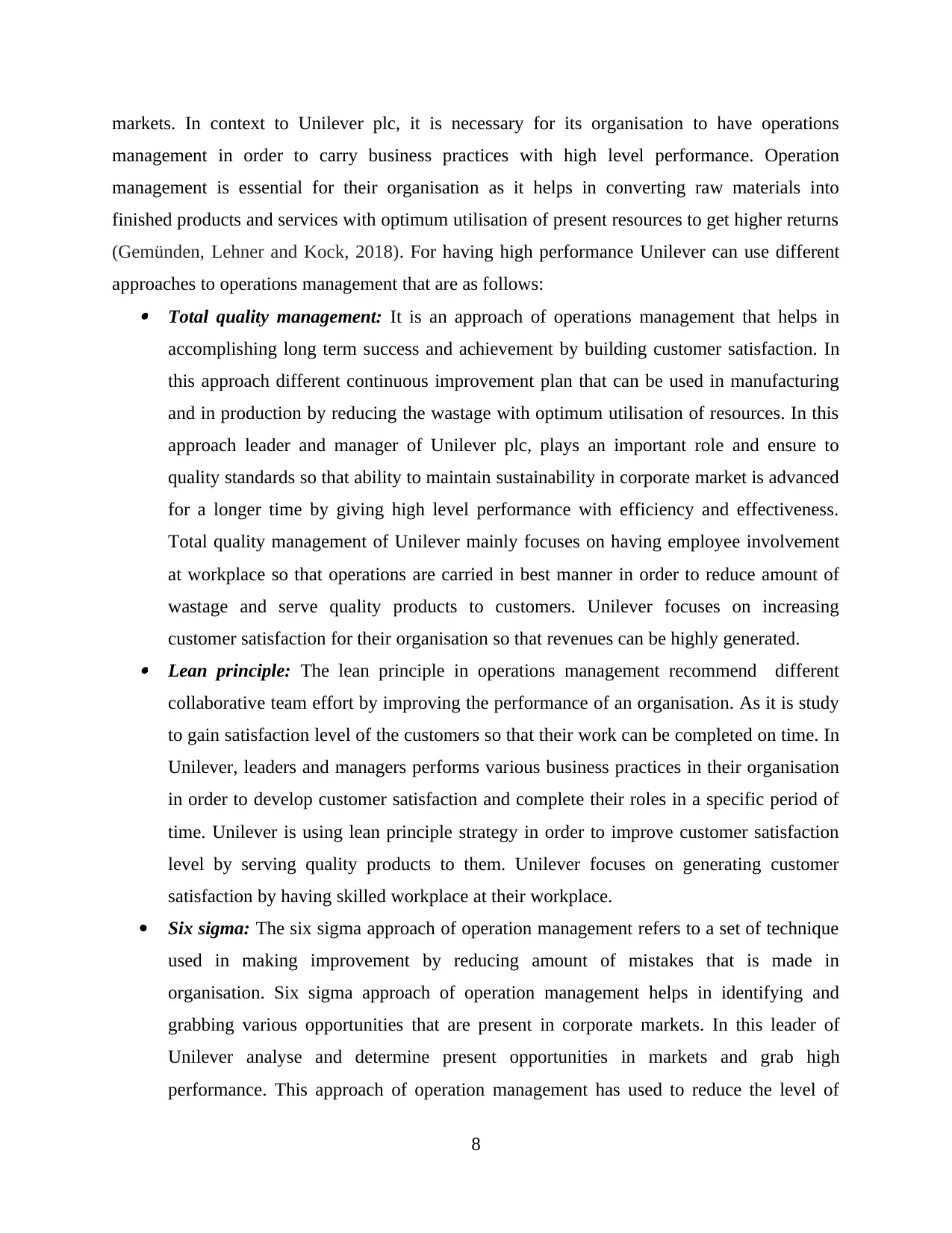
markets. In context to Unilever plc, it is necessary for its organisation to have operations
management in order to carry business practices with high level performance. Operation
management is essential for their organisation as it helps in converting raw materials into
finished products and services with optimum utilisation of present resources to get higher returns
(Gemünden, Lehner and Kock, 2018). For having high performance Unilever can use different
approaches to operations management that are as follows: Total quality management: It is an approach of operations management that helps in
accomplishing long term success and achievement by building customer satisfaction. In
this approach different continuous improvement plan that can be used in manufacturing
and in production by reducing the wastage with optimum utilisation of resources. In this
approach leader and manager of Unilever plc, plays an important role and ensure to
quality standards so that ability to maintain sustainability in corporate market is advanced
for a longer time by giving high level performance with efficiency and effectiveness.
Total quality management of Unilever mainly focuses on having employee involvement
at workplace so that operations are carried in best manner in order to reduce amount of
wastage and serve quality products to customers. Unilever focuses on increasing
customer satisfaction for their organisation so that revenues can be highly generated. Lean principle: The lean principle in operations management recommend different
collaborative team effort by improving the performance of an organisation. As it is study
to gain satisfaction level of the customers so that their work can be completed on time. In
Unilever, leaders and managers performs various business practices in their organisation
in order to develop customer satisfaction and complete their roles in a specific period of
time. Unilever is using lean principle strategy in order to improve customer satisfaction
level by serving quality products to them. Unilever focuses on generating customer
satisfaction by having skilled workplace at their workplace.
Six sigma: The six sigma approach of operation management refers to a set of technique
used in making improvement by reducing amount of mistakes that is made in
organisation. Six sigma approach of operation management helps in identifying and
grabbing various opportunities that are present in corporate markets. In this leader of
Unilever analyse and determine present opportunities in markets and grab high
performance. This approach of operation management has used to reduce the level of
8
management in order to carry business practices with high level performance. Operation
management is essential for their organisation as it helps in converting raw materials into
finished products and services with optimum utilisation of present resources to get higher returns
(Gemünden, Lehner and Kock, 2018). For having high performance Unilever can use different
approaches to operations management that are as follows: Total quality management: It is an approach of operations management that helps in
accomplishing long term success and achievement by building customer satisfaction. In
this approach different continuous improvement plan that can be used in manufacturing
and in production by reducing the wastage with optimum utilisation of resources. In this
approach leader and manager of Unilever plc, plays an important role and ensure to
quality standards so that ability to maintain sustainability in corporate market is advanced
for a longer time by giving high level performance with efficiency and effectiveness.
Total quality management of Unilever mainly focuses on having employee involvement
at workplace so that operations are carried in best manner in order to reduce amount of
wastage and serve quality products to customers. Unilever focuses on increasing
customer satisfaction for their organisation so that revenues can be highly generated. Lean principle: The lean principle in operations management recommend different
collaborative team effort by improving the performance of an organisation. As it is study
to gain satisfaction level of the customers so that their work can be completed on time. In
Unilever, leaders and managers performs various business practices in their organisation
in order to develop customer satisfaction and complete their roles in a specific period of
time. Unilever is using lean principle strategy in order to improve customer satisfaction
level by serving quality products to them. Unilever focuses on generating customer
satisfaction by having skilled workplace at their workplace.
Six sigma: The six sigma approach of operation management refers to a set of technique
used in making improvement by reducing amount of mistakes that is made in
organisation. Six sigma approach of operation management helps in identifying and
grabbing various opportunities that are present in corporate markets. In this leader of
Unilever analyse and determine present opportunities in markets and grab high
performance. This approach of operation management has used to reduce the level of
8
Paraphrase This Document
Need a fresh take? Get an instant paraphrase of this document with our AI Paraphraser
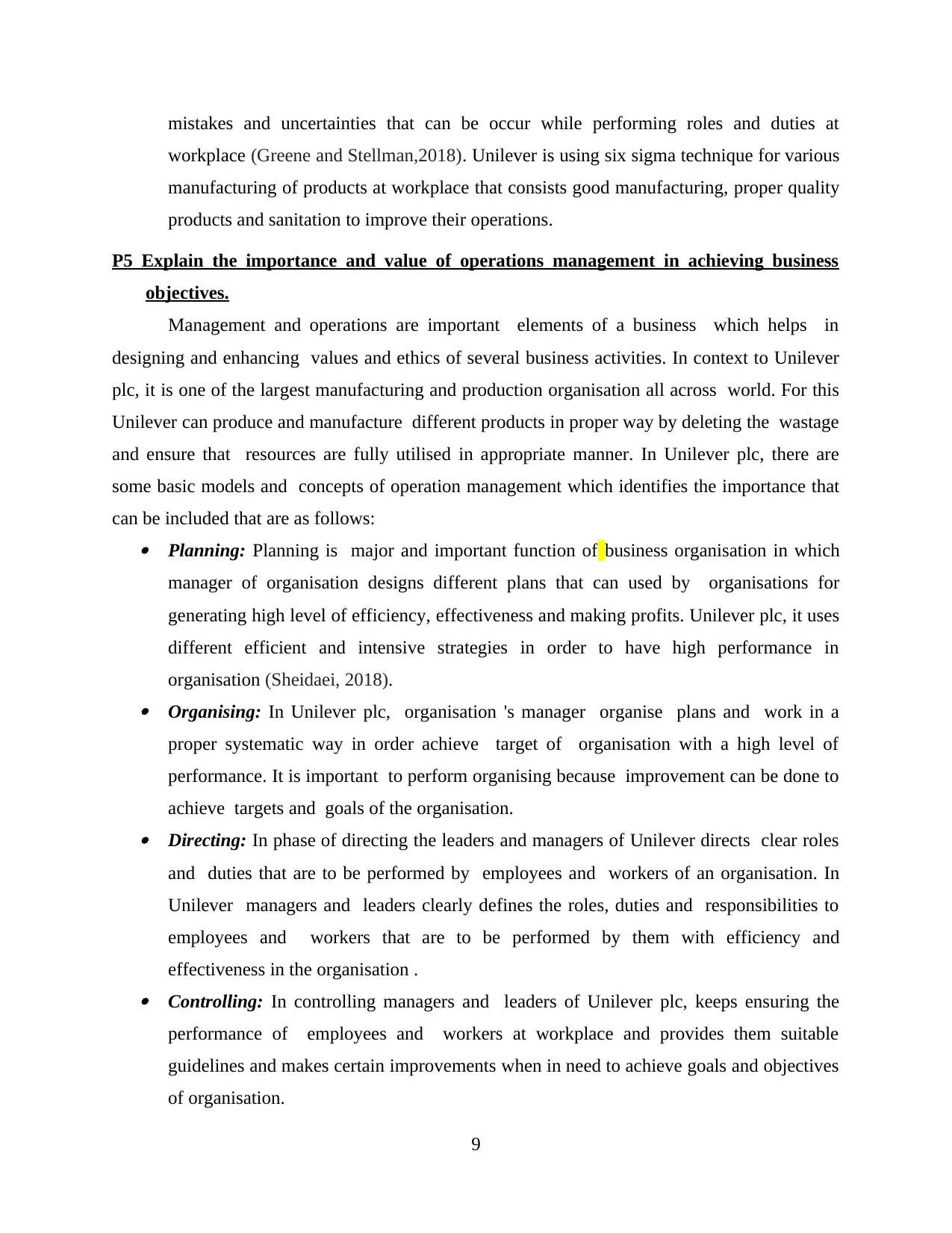
mistakes and uncertainties that can be occur while performing roles and duties at
workplace (Greene and Stellman,2018). Unilever is using six sigma technique for various
manufacturing of products at workplace that consists good manufacturing, proper quality
products and sanitation to improve their operations.
P5 Explain the importance and value of operations management in achieving business
objectives.
Management and operations are important elements of a business which helps in
designing and enhancing values and ethics of several business activities. In context to Unilever
plc, it is one of the largest manufacturing and production organisation all across world. For this
Unilever can produce and manufacture different products in proper way by deleting the wastage
and ensure that resources are fully utilised in appropriate manner. In Unilever plc, there are
some basic models and concepts of operation management which identifies the importance that
can be included that are as follows: Planning: Planning is major and important function of business organisation in which
manager of organisation designs different plans that can used by organisations for
generating high level of efficiency, effectiveness and making profits. Unilever plc, it uses
different efficient and intensive strategies in order to have high performance in
organisation (Sheidaei, 2018). Organising: In Unilever plc, organisation 's manager organise plans and work in a
proper systematic way in order achieve target of organisation with a high level of
performance. It is important to perform organising because improvement can be done to
achieve targets and goals of the organisation. Directing: In phase of directing the leaders and managers of Unilever directs clear roles
and duties that are to be performed by employees and workers of an organisation. In
Unilever managers and leaders clearly defines the roles, duties and responsibilities to
employees and workers that are to be performed by them with efficiency and
effectiveness in the organisation . Controlling: In controlling managers and leaders of Unilever plc, keeps ensuring the
performance of employees and workers at workplace and provides them suitable
guidelines and makes certain improvements when in need to achieve goals and objectives
of organisation.
9
workplace (Greene and Stellman,2018). Unilever is using six sigma technique for various
manufacturing of products at workplace that consists good manufacturing, proper quality
products and sanitation to improve their operations.
P5 Explain the importance and value of operations management in achieving business
objectives.
Management and operations are important elements of a business which helps in
designing and enhancing values and ethics of several business activities. In context to Unilever
plc, it is one of the largest manufacturing and production organisation all across world. For this
Unilever can produce and manufacture different products in proper way by deleting the wastage
and ensure that resources are fully utilised in appropriate manner. In Unilever plc, there are
some basic models and concepts of operation management which identifies the importance that
can be included that are as follows: Planning: Planning is major and important function of business organisation in which
manager of organisation designs different plans that can used by organisations for
generating high level of efficiency, effectiveness and making profits. Unilever plc, it uses
different efficient and intensive strategies in order to have high performance in
organisation (Sheidaei, 2018). Organising: In Unilever plc, organisation 's manager organise plans and work in a
proper systematic way in order achieve target of organisation with a high level of
performance. It is important to perform organising because improvement can be done to
achieve targets and goals of the organisation. Directing: In phase of directing the leaders and managers of Unilever directs clear roles
and duties that are to be performed by employees and workers of an organisation. In
Unilever managers and leaders clearly defines the roles, duties and responsibilities to
employees and workers that are to be performed by them with efficiency and
effectiveness in the organisation . Controlling: In controlling managers and leaders of Unilever plc, keeps ensuring the
performance of employees and workers at workplace and provides them suitable
guidelines and makes certain improvements when in need to achieve goals and objectives
of organisation.
9
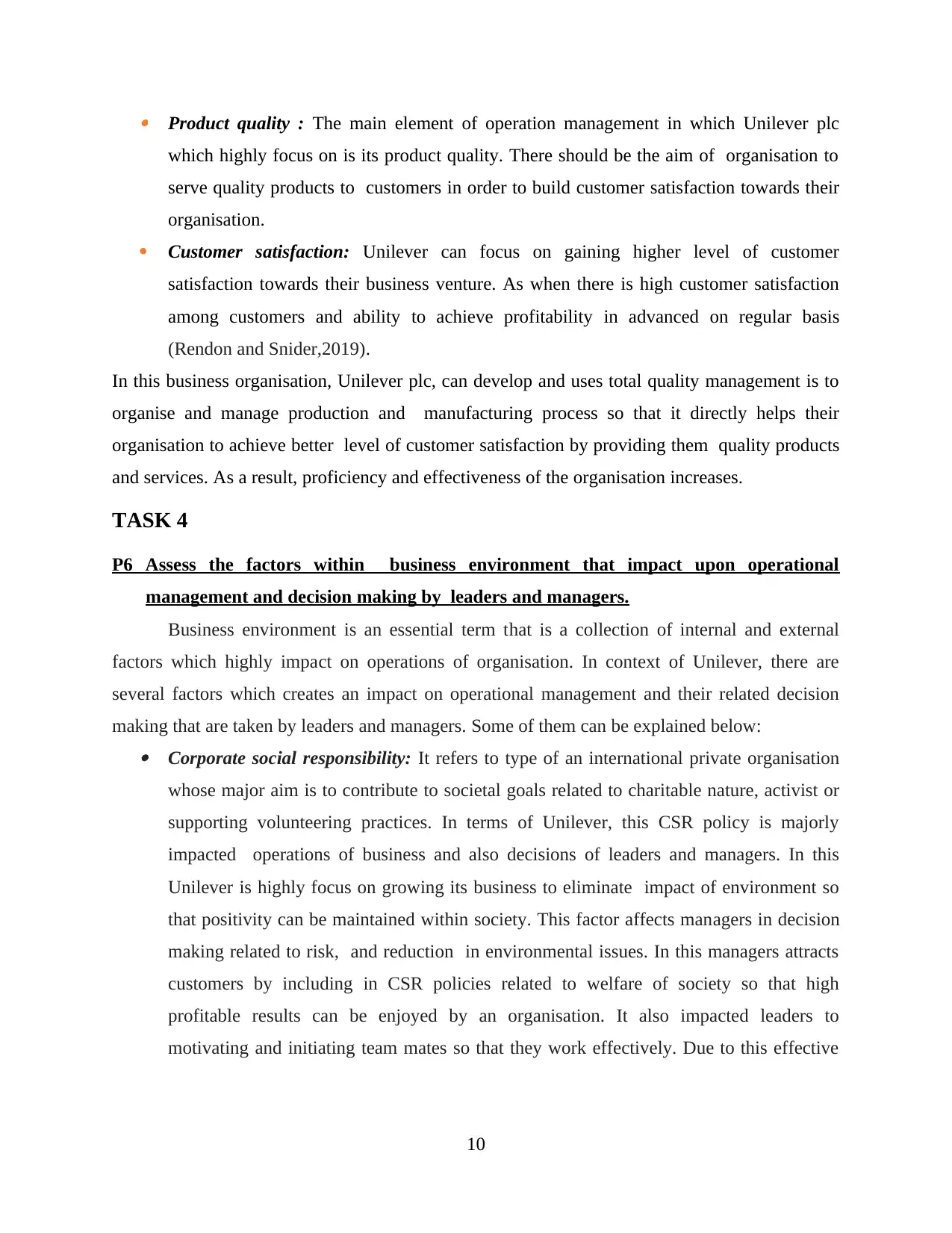
Product quality : The main element of operation management in which Unilever plc
which highly focus on is its product quality. There should be the aim of organisation to
serve quality products to customers in order to build customer satisfaction towards their
organisation.
Customer satisfaction: Unilever can focus on gaining higher level of customer
satisfaction towards their business venture. As when there is high customer satisfaction
among customers and ability to achieve profitability in advanced on regular basis
(Rendon and Snider,2019).
In this business organisation, Unilever plc, can develop and uses total quality management is to
organise and manage production and manufacturing process so that it directly helps their
organisation to achieve better level of customer satisfaction by providing them quality products
and services. As a result, proficiency and effectiveness of the organisation increases.
TASK 4
P6 Assess the factors within business environment that impact upon operational
management and decision making by leaders and managers.
Business environment is an essential term that is a collection of internal and external
factors which highly impact on operations of organisation. In context of Unilever, there are
several factors which creates an impact on operational management and their related decision
making that are taken by leaders and managers. Some of them can be explained below: Corporate social responsibility: It refers to type of an international private organisation
whose major aim is to contribute to societal goals related to charitable nature, activist or
supporting volunteering practices. In terms of Unilever, this CSR policy is majorly
impacted operations of business and also decisions of leaders and managers. In this
Unilever is highly focus on growing its business to eliminate impact of environment so
that positivity can be maintained within society. This factor affects managers in decision
making related to risk, and reduction in environmental issues. In this managers attracts
customers by including in CSR policies related to welfare of society so that high
profitable results can be enjoyed by an organisation. It also impacted leaders to
motivating and initiating team mates so that they work effectively. Due to this effective
10
which highly focus on is its product quality. There should be the aim of organisation to
serve quality products to customers in order to build customer satisfaction towards their
organisation.
Customer satisfaction: Unilever can focus on gaining higher level of customer
satisfaction towards their business venture. As when there is high customer satisfaction
among customers and ability to achieve profitability in advanced on regular basis
(Rendon and Snider,2019).
In this business organisation, Unilever plc, can develop and uses total quality management is to
organise and manage production and manufacturing process so that it directly helps their
organisation to achieve better level of customer satisfaction by providing them quality products
and services. As a result, proficiency and effectiveness of the organisation increases.
TASK 4
P6 Assess the factors within business environment that impact upon operational
management and decision making by leaders and managers.
Business environment is an essential term that is a collection of internal and external
factors which highly impact on operations of organisation. In context of Unilever, there are
several factors which creates an impact on operational management and their related decision
making that are taken by leaders and managers. Some of them can be explained below: Corporate social responsibility: It refers to type of an international private organisation
whose major aim is to contribute to societal goals related to charitable nature, activist or
supporting volunteering practices. In terms of Unilever, this CSR policy is majorly
impacted operations of business and also decisions of leaders and managers. In this
Unilever is highly focus on growing its business to eliminate impact of environment so
that positivity can be maintained within society. This factor affects managers in decision
making related to risk, and reduction in environmental issues. In this managers attracts
customers by including in CSR policies related to welfare of society so that high
profitable results can be enjoyed by an organisation. It also impacted leaders to
motivating and initiating team mates so that they work effectively. Due to this effective
10
⊘ This is a preview!⊘
Do you want full access?
Subscribe today to unlock all pages.

Trusted by 1+ million students worldwide
1 out of 15
Related Documents
Your All-in-One AI-Powered Toolkit for Academic Success.
+13062052269
info@desklib.com
Available 24*7 on WhatsApp / Email
![[object Object]](/_next/static/media/star-bottom.7253800d.svg)
Unlock your academic potential
Copyright © 2020–2026 A2Z Services. All Rights Reserved. Developed and managed by ZUCOL.





